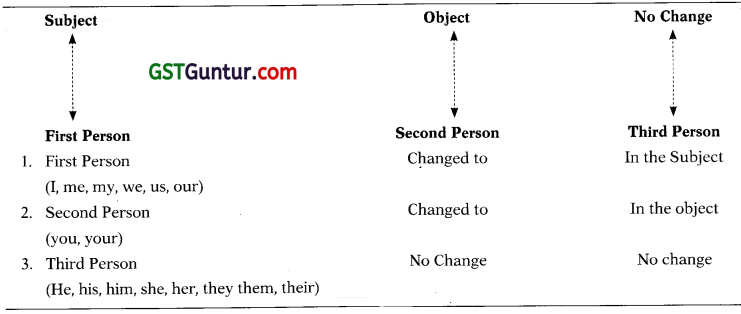Browsing through Direct and Indirect Speech – CA Foundation BCR Notes Pdf help students to revise the complete subject quickly.
Direct and Indirect Speech – BCR Notes CA Foundation
Meaning And Kinds of Narration:
Narration means the art of reporting the words of a speaker. Inverted commas (“…….”) are used when expressing the speaker’s words in their original form. This type of narration is called ‘Direct Speech’ Example – The teacher said to us, “I shall give a test tomorrow.”
On the other hand, when you express the speaker’s words in your own words, the narration is known as ‘Indirect Speech’. Inverted commas are not used in this kind of narration, Example – The teacher told us that he would give a test tomorrow.
![]()
Direct To Indirect Speech:
In order to convert direct speech into indirect speech, the following rules are followed.
(i) Change the reporting verb (said to) as per the sentence in the reported speech. For example, ‘said to’ is changed into ‘told’ in the above sentence.
(ii) Remove the inverted commas and put appropriate conjunction in their place. For example, in the above statement ‘that’ is used in place of inverted commas.
(iii) Change the pronoun of the reported speech. For example ‘he’ is put in place of ‘I’. Pronouns are changed according to the person involved.

Illustrative Examples:
Rule 1: The pronoun of the first person in the reported speech is changed according to the subject of the reporting verb.
(i) Direct : He says, “I am in the right”
Indirect : He says that he is in the right
(ii) Direct : You say, “I am in the right”
Indirect : You say that you are in the right
(iii) Direct : I say, “I am in the right”
Indirect : I say, “I am in the right”
(iv) Direct : They say, “We are in the right”
Indirect : They say that they are in the right
![]()
Rule 2 : The pronoun of second person in the reported speech is changed according to the object of the reporting verb:
(i) Direct : He says to me, “You have done your job”
Indirect : He tells me that I have done my job
(ii) Direct : She says to him, “You have done your job”
Indirect : She tells him that he has done his job
(iii) Direct : You say to her, “You have done your job”
Indirect : You tell her that she has done her job
(iv) Direct : I say to her, “You have done your job”
In direct : I tell her that she has done her job
Rule 3 : The pronoun of the third person in the reported speech remains unchanged.
(i) Direct : He says, “She does not take coffee”
Indirect : He says that she does not take coffee
(ii) Direct : Nobody says, She has told a lie”
Indirect : Nobody says that she has told a lie
Rule 4 : If the reporting verb is given in the present or future tense, the tense of the verb in reportec speech.
(i) Direct : The manager says, “Ramesh works harda
Indirect : The manager says that Ramesh works hard
(ii) Direct : The manager has said, “Ramesh worked hardw
Indirect : The manager has said that Ramesh has worked hard
(iii) Direct : The manager is saying, “Ramesh has worked hard”.
Indirect : The manager is saying that Ramesh has worked hard
(iv) Direct : The manager will say, “Ramesh is working hard”
Indirect : The manager will say that Ramesh is working hard
![]()
Rule 5 : If reporting verb is given in past tense then the tense of the verb in the reported speech is changed into past tense.
(i) Convert simple present into simple past tense Direct : He said, “I am strong”
Indirect : He said that he was strong
(ii) Convert present continuous into past continuous Direct: She said, “I am going to the college” Indirect: She said that she was going to the college
(iii) Convert present perfect into past perfect
Direct : He said to me, “I have seen the London Eye twice”
Indirect : He said to me that he had seen the London Eye twice
(iv) Change present perfect continuous to past perfect continuous Direct : She said, “it has been raining since morning”
Indirect : She said that it has been raining since morning
(v) Change simple past to paste perfect
Direct : He said to me, “I saw a foreigner in the market”
Indirect : He told me that he had seen a foreigner in the market
(vi) Change past continuous to past perfect continuous
Direct : She said, “I was listening the radio”
Indirect : She said that she had been listening the radio
(vii) Change will/shall in future tense to would
Direct : He said to me, “I shall come soon”
Indirect : He told me that she would come soon
(viii) Convert can into could
Direct : She said, “I can go to Mumbai alone”
Indirect : She said that she could go to Mumbai alone
(ix) Change may into might
Direct : He said, “It may rain tomorrow”
Indirect : He said that it might rain tomorrow
Rule 6 : If universal truth, habitual fact, two actions, and imagined condition happening at the same time are given in reported speech, the tense is not changed.
(i) Direct : Our mother said, ‘The God is omni present
Indirect : Our mother said that the God is a omni present (Universal truth)
(ii) Direct : Deepa said to me, “I write with my left hand”
Indirect : Deepa told me that she writes îith her left hand (habitual fact)
(iii) Direct : She said, my brother was watching TV while I was reading a poem
Indirect : She said that her brother was watching TV while she was reading a poem
(iv) Direct : She said, If I were you, I would teach him
Indirect : She said if she were you, she would teach him
![]()
Indirect To Direct Speech:
In order to convert the indirect speech into direct speech, follow the opposite of the rules given above.
1. Told, asked, advised, ordered, requested, proposed, suggested, wished, prayed, exclaimed given in reporting verbs, are converted into “said” or “said to”
2. If, that, whether, to are converted into inverted commas. The first word in inverted commas is written into capital letter
3. In case of the pronouns in the reported speech if these are consistent subject of the reporting verb, then convert then into 1st person.
(i) Indirect : She told me that she would help me
Direct : She said to me, I shall help you”
(ii) Indirect : I asked her if she could help me?
Direct : I said to her, scan you help me”?
(iii) Indirect : He exclaimed with joy that he had won the race
Direct : He said, “Hurrah! I have won a prize”
(iv) Indirect : She wished that she would be the Principal
Direct : She said, “If I were the Principal”
